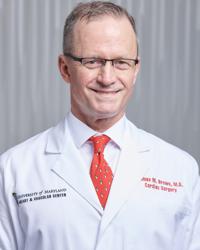Coronary Artery Disease

Coronary artery disease (CAD) is partial or total blockage of the arteries that supply blood and oxygen to the heart. CAD is the most common type of heart disease.
Although CAD is the leading cause of death for men and women in the U.S., it is very treatable.
University of Maryland Capital Region Health's Heart & Vascular Institute ranks in the top 10 percent in the nation in coronary bypass surgery. Our expert team is ready to help you through surgery and as you work on lifestyle changes and recovery.
Make an appointment with us by calling 240-677-0248.
Coronary Artery Disease Causes
CAD usually results from the buildup in arteries of plaque, made up of cholesterol and other fatty material. This buildup is called atherosclerosis. This prevents the heart muscle from getting the blood and oxygen it needs, leading to chest pain or a heart attack. Over time, CAD can weaken the heart muscle and contribute to heart failure and arrhythmias.
CAD Risk Factors
Risk factors include a family history of coronary heart disease, stroke or peripheral arterial disease, especially before age 50 in men or age 60 in women. Other risk factors are:
- Family History
- Race or ethnicity – African-American, Caucasian, South Asian are more at risk
- Tobacco smoking
- High blood pressure
- Diabetes
- High cholesterol
- Lack of physical activity or exercise
- Obesity
To help prevent CAD, focus on the risk factors you can control. For example, quit smoking or don’t start, and make sure you get enough exercise.
Coronary Artery Disease Treatment
Heart specialists at the University of Maryland Heart and Vascular Center offer the latest medical and surgical treatment for CAD, including:
Medical Management
Your treatment may include medications with lifestyle modifications such as dietary management, quitting smoking, exercise and cholesterol management.
Catheter-Based Options
Catheters are thin tubes inserted through a vein, guided to a specific area of the heart to deliver medications or to perform procedures. Catheter-based options include:
- Angioplasty and stenting procedures – Angioplasty improves blood flow to the heart and extremities. A stent is a small, wire-mesh tube permanently inserted in a narrowed artery to expand and open it.
- Coronary atherectomy – Removes plaque from arteries.
- Brachytherapy – Radiation therapy to treat recurring arterial narrowing (restenosis) treatment of restenosis (when the narrowing occurs again).
Heart Bypass Surgery
Our experienced cardiac surgeons have the expertise and resources to offer comprehensive, advanced coronary procedures. We make sure you have treatment most suited to your needs and condition to ensure you have the best outcome possible.
- Angioplasty and Stenting – We use a catheter to insert and expand a small balloon in the artery, and insert a stent to keep the artery open.
- Coronary Artery Bypass Grafting – CABG, or cabbage, is open surgery that uses a section of artery from another place in your body to make a bypass around a blocked heart artery.
- Hybrid Coronary Intervention – Two surgeries in one, open bypass surgery is followed by minimally invasive angioplasty and stenting.
- Minimally Invasive Direct Coronary Artery Bypass – MIDCAB is a minimally invasive, robotic bypass procedure.
- Transmyocardial Revascularization – For patients who can’t have open bypass surgery, TMR is a highly specialized procedure that uses a laser to make small holes in the heart muscle to reduce angina.
Make an Appointment
Make an appointment with one of our heart specialists. Call 240-677-0248.


